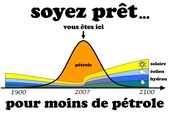1987, 1997, 2000, 2007
Financial crises, learn nothing from them ...
Elsewhere, the decision would have been deemed "populist". But it was in London, the city's stronghold and the financial heart of Europe, that the government of Mr. Gordon Brown decided to nationalize a large bank in difficulty, the Northern Rock. Certainly, it would only be a “temporary transfer of property to the public sector”. The fact remains that it is in the homeland of Mrs. Margaret Thatcher that the State intervenes. Its missions: to pay off debts, after having already guaranteed deposits on public funds, a commitment of 55 billion pounds (72 billion euros) ; then chase the bad payers - the ones who are thoughtlessly into debt. Once the cleaning has been carried out, the bank must return to the private sector, according to an old principle: nationalization of losses and privatization of profits. Germany flew to the rescue of the IKB Deutsche Industriebank. In the United States, Citigroup and Merrill Lynch had to call on sovereign wealth funds from Asia and the Near East. These financial gusts are not new. Predictable, they are part of a deregulation movement which, in France, started just twenty-five years ago.
By Frédéric Lordon
and continued there: http://www.monde-diplomatique.fr/2008/03/LORDON/15659

